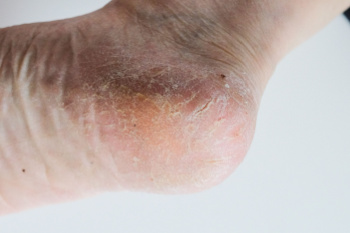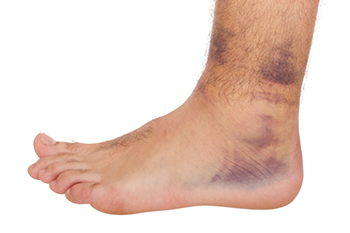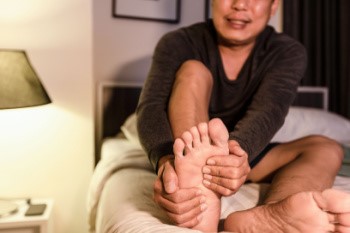
Running is an excellent way to stay fit, but it can sometimes lead to ankle pain. This discomfort often arises from overuse, improper footwear, or running on uneven surfaces. When you run, your ankles absorb significant impact with each step, which can strain the ligaments, tendons, and muscles around the joint. Overuse injuries occur when the ankle is repeatedly stressed without sufficient rest, leading to inflammation and pain. Wearing shoes that do not provide adequate support or cushioning can worsen this issue, as can running on surfaces that are too hard or uneven, increasing the risk of spraining the ankle. Additionally, biomechanical issues, such as improper running form or flat feet, can contribute to ankle pain by placing extra strain on the joint. To prevent ankle pain, it is important to wear proper running shoes and run on suitable surfaces. If you have developed ankle pain from running, it is suggested that you contact a podiatrist who can guide you toward relief and injury prevention tips.
Sports related foot and ankle injuries require proper treatment before players can go back to their regular routines. For more information, contact Brent Harwood, DPM of Southeast Podiatry. Our doctor can provide the care you need to keep you pain-free and on your feet.
Sports Related Foot and Ankle Injuries
Foot and ankle injuries are a common occurrence when it comes to athletes of any sport. While many athletes dismiss the initial aches and pains, the truth is that ignoring potential foot and ankle injuries can lead to serious problems. As athletes continue to place pressure and strain the area further, a mild injury can turn into something as serious as a rupture and may lead to a permanent disability. There are many factors that contribute to sports related foot and ankle injuries, which include failure to warm up properly, not providing support or wearing bad footwear. Common injuries and conditions athletes face, including:
Sports related injuries are commonly treated using the RICE method. This includes rest, applying ice to the injured area, compression and elevating the ankle. More serious sprains and injuries may require surgery, which could include arthroscopic and reconstructive surgery. Rehabilitation and therapy may also be required in order to get any recovering athlete to become fully functional again. Any unusual aches and pains an athlete sustains must be evaluated by a licensed, reputable medical professional.
If you have any questions please feel free to contact one of our offices located in Fairhope, Brewton, and Atmore, AL . We offer the newest diagnostic and treatment technologies for all your foot and ankle needs.
 Cracked heels occur when the skin on the heels becomes dry and thickens, leading to fissures. The cracks can be caused by prolonged standing, wearing open-back shoes, and skin conditions such as eczema or psoriasis. Cracked heels often appear as dry, rough patches with visible splits, which can feel painful and tender, especially when pressure is applied. Beyond their unsightly appearance, cracked heels can lead to serious complications. The deep fissures can become infected, causing swelling, redness, and bleeding. If left untreated, this can result in cellulitis, a painful bacterial skin infection. For individuals with diabetes or compromised immune systems, the risks are even greater because infections can spread easily and become severe. To prevent and treat cracked heels, it is suggested that you schedule an appointment with a podiatrist who can provide effective treatment solutions, and prevent further complications.
Cracked heels occur when the skin on the heels becomes dry and thickens, leading to fissures. The cracks can be caused by prolonged standing, wearing open-back shoes, and skin conditions such as eczema or psoriasis. Cracked heels often appear as dry, rough patches with visible splits, which can feel painful and tender, especially when pressure is applied. Beyond their unsightly appearance, cracked heels can lead to serious complications. The deep fissures can become infected, causing swelling, redness, and bleeding. If left untreated, this can result in cellulitis, a painful bacterial skin infection. For individuals with diabetes or compromised immune systems, the risks are even greater because infections can spread easily and become severe. To prevent and treat cracked heels, it is suggested that you schedule an appointment with a podiatrist who can provide effective treatment solutions, and prevent further complications.
Cracked heels are unsightly and can cause further damage to your shoes and feet. If you have any concerns, contact Brent Harwood, DPM from Southeast Podiatry. Our doctor can provide the care you need to keep you pain-free and on your feet.
Cracked Heels
Cracked heels appear unappealing and can make it harder for you walk around in sandals. Aside from looking unpleasant, cracked heels can also tear stockings, socks, and wear out your shoes. There are several methods to help restore a cracked heel and prevent further damage.
How Do You Get Them?
Dry skin is the number one culprit in creating cracked heels. Many athletes, walkers, joggers, and even swimmers suffer from cracked heels. Age and skin oil production play a role to getting cracked heels as well.
Promote Healing
Over the counter medicines can help, especially for those that need instant relief or who suffer from chronic dry feet.
Wear Socks – Wearing socks with medicated creams helps lock in moisture.
Moisturizers – Applying both day and night will help alleviate dryness which causes cracking.
Pumice Stones – These exfoliate and remove dead skin, which allows for smoother moisturizer application and better absorption into the skin.
Change in Diet
Eating healthy with a well-balanced diet will give the skin a fresh and radiant look. Your body responds to the kinds of food you ingest. Omega-3 fatty acids and zinc supplements can also revitalize skin tissue.
Most importantly, seek professional help if unsure how to proceed in treating cracked heels. A podiatrist will help you with any questions or information needed.
If you have any questions, please feel free to contact one of our offices located in Fairhope, Brewton, and Atmore, AL . We offer the newest diagnostic and treatment technologies for all your foot care needs.
 Ankle sprains, while commonly known for affecting ligaments, can also lead to peripheral nerve damage when the injury is severe. Peripheral nerve damage can occur when the nerves around the ankle are stretched, compressed, or torn during the sprain. Symptoms of peripheral nerve damage from an ankle sprain include tingling, numbness, or a burning sensation in the foot or along the ankle. Some patients might also experience a sensation of “pins and needles.” They may also have a lowered ability to feel touch, pain, or temperature changes. Severe cases can result in a limited ability to walk due to muscle weakness. Proper diagnosis and treatment are important to manage symptoms effectively. A podiatrist, or foot doctor, can use tools like nerve conduction studies to assess the extent of nerve damage. They may suggest various treatments, including targeted stretching techniques to strengthen and restore function and medications that help manage pain and nerve symptoms. To alleviate pain and minimize the risk of chronic ankle pain, it is suggested that you consult a podiatrist for treatment options.
Ankle sprains, while commonly known for affecting ligaments, can also lead to peripheral nerve damage when the injury is severe. Peripheral nerve damage can occur when the nerves around the ankle are stretched, compressed, or torn during the sprain. Symptoms of peripheral nerve damage from an ankle sprain include tingling, numbness, or a burning sensation in the foot or along the ankle. Some patients might also experience a sensation of “pins and needles.” They may also have a lowered ability to feel touch, pain, or temperature changes. Severe cases can result in a limited ability to walk due to muscle weakness. Proper diagnosis and treatment are important to manage symptoms effectively. A podiatrist, or foot doctor, can use tools like nerve conduction studies to assess the extent of nerve damage. They may suggest various treatments, including targeted stretching techniques to strengthen and restore function and medications that help manage pain and nerve symptoms. To alleviate pain and minimize the risk of chronic ankle pain, it is suggested that you consult a podiatrist for treatment options.
Ankle sprains are common but need immediate attention. If you need your feet checked, contact Brent Harwood, DPM from Southeast Podiatry. Our doctor can provide the care you need to keep you pain-free and on your feet.
How Does an Ankle Sprain Occur?
Ankle sprains take place when the ligaments in your ankle are torn or stretched beyond their limits. There are multiple ways that the ankle can become injured, including twisting or rolling over onto your ankle, putting undue stress on it, or causing trauma to the ankle itself.
What Are the Symptoms?
Preventing a Sprain
Treatment of a Sprain
Treatment of a sprain depends on the severity. Many times, people are told to rest and remain off their feet completely, while others are given an air cast. If the sprain is very severe, surgery may be required.
If you have suffered an ankle sprain previously, you may want to consider additional support such as a brace and regular exercises to strengthen the ankle.
If you have any questions please feel free to contact one of our offices located in Fairhope, Brewton, and Atmore, AL . We offer the newest diagnostic and treatment technologies for all your foot and ankle needs.
 Peripheral neuropathy, a complication of diabetes, occurs when high levels of fats or sugar in the blood damage nerves throughout the body, particularly in the extremities like the feet and hands. Symptoms include numbness, tingling, pain, and loss of sensation in these areas. Peripheral neuropathy often progresses gradually and can be unnoticed until its more advanced stages. Diagnosis involves a thorough physical examination by a podiatrist to assess reflexes, sensation loss, and skin changes. Additional tests like electromyograms, EMG, or nerve conduction velocity tests, abbreviated NCV, may be required for confirmation. While there is no cure for peripheral neuropathy, managing blood sugar levels is the best way to slow its progression. Treatment focuses on alleviating symptoms and preventing complications, such as ulcers. It is important to seek care from a podiatrist, a doctor who specializes in foot and ankle health, for comprehensive management of peripheral neuropathy. To help maintain mobility and prevent complications like ulcers and amputations, it is suggested that you include a podiatrist in your medical team.
Peripheral neuropathy, a complication of diabetes, occurs when high levels of fats or sugar in the blood damage nerves throughout the body, particularly in the extremities like the feet and hands. Symptoms include numbness, tingling, pain, and loss of sensation in these areas. Peripheral neuropathy often progresses gradually and can be unnoticed until its more advanced stages. Diagnosis involves a thorough physical examination by a podiatrist to assess reflexes, sensation loss, and skin changes. Additional tests like electromyograms, EMG, or nerve conduction velocity tests, abbreviated NCV, may be required for confirmation. While there is no cure for peripheral neuropathy, managing blood sugar levels is the best way to slow its progression. Treatment focuses on alleviating symptoms and preventing complications, such as ulcers. It is important to seek care from a podiatrist, a doctor who specializes in foot and ankle health, for comprehensive management of peripheral neuropathy. To help maintain mobility and prevent complications like ulcers and amputations, it is suggested that you include a podiatrist in your medical team.
Neuropathy
Neuropathy can be a potentially serious condition, especially if it is left undiagnosed. If you have any concerns that you may be experiencing nerve loss in your feet, consult with Brent Harwood, DPM from Southeast Podiatry. Our doctor will assess your condition and provide you with quality foot and ankle treatment for neuropathy.
What Is Neuropathy?
Neuropathy is a condition that leads to damage to the nerves in the body. Peripheral neuropathy, or neuropathy that affects your peripheral nervous system, usually occurs in the feet. Neuropathy can be triggered by a number of different causes. Such causes include diabetes, infections, cancers, disorders, and toxic substances.
Symptoms of Neuropathy Include:
Those with diabetes are at serious risk due to being unable to feel an ulcer on their feet. Diabetics usually also suffer from poor blood circulation. This can lead to the wound not healing, infections occurring, and the limb may have to be amputated.
Treatment
To treat neuropathy in the foot, podiatrists will first diagnose the cause of the neuropathy. Figuring out the underlying cause of the neuropathy will allow the podiatrist to prescribe the best treatment, whether it be caused by diabetes, toxic substance exposure, infection, etc. If the nerve has not died, then it’s possible that sensation may be able to return to the foot.
Pain medication may be issued for pain. Electrical nerve stimulation can be used to stimulate nerves. If the neuropathy is caused from pressure on the nerves, then surgery may be necessary.
If you have any questions please feel free to contact our offices located in Fairhope, Brewton, and Atmore, AL. We offer the newest diagnostic and treatment technologies for all your podiatric needs.
 Heel spur surgery stands as a significant decision for those grappling with persistent heel pain. Understanding the procedure's intricacies unveils vital insights. The surgery involves excising the bony protrusion from the heel bone, often performed under local or general anesthesia. It typically necessitates a recovery period, during which mobility may be limited, demanding patience and adherence to post-operative instructions. Complications such as infection or nerve damage, though rare, underscore the importance of meticulous post-operative care. The decision to undergo surgery hinges on various factors, including the severity of symptoms and the efficacy of non-surgical interventions. Consulting with a podiatrist is essential for informed decision-making, as they can provide tailored guidance based on individual circumstances. While heel spur surgery offers relief for many, it is important to approach it with a thorough understanding of the process, potential outcomes, and commitment to recovery. If you have a heel spur that is causing pain, it is strongly suggested that you confer with a podiatrist who can determine if heel spur surgery is right for you.
Heel spur surgery stands as a significant decision for those grappling with persistent heel pain. Understanding the procedure's intricacies unveils vital insights. The surgery involves excising the bony protrusion from the heel bone, often performed under local or general anesthesia. It typically necessitates a recovery period, during which mobility may be limited, demanding patience and adherence to post-operative instructions. Complications such as infection or nerve damage, though rare, underscore the importance of meticulous post-operative care. The decision to undergo surgery hinges on various factors, including the severity of symptoms and the efficacy of non-surgical interventions. Consulting with a podiatrist is essential for informed decision-making, as they can provide tailored guidance based on individual circumstances. While heel spur surgery offers relief for many, it is important to approach it with a thorough understanding of the process, potential outcomes, and commitment to recovery. If you have a heel spur that is causing pain, it is strongly suggested that you confer with a podiatrist who can determine if heel spur surgery is right for you.
Foot surgery is sometimes necessary to treat a foot ailment. To learn more, contact Brent Harwood, DPM from Southeast Podiatry. Our doctor will assist you with all of your foot and ankle needs.
When Is Surgery Necessary?
Foot and ankle surgery is generally reserved for cases in which less invasive, conservative procedures have failed to alleviate the problem. Some of the cases in which surgery may be necessary include:
What Types of Surgery Are There?
The type of surgery you receive will depend on the nature of the problem you have. Some of the possible surgeries include:
Benefits of Surgery
Although surgery is usually a last resort, it can provide more complete pain relief compared to non-surgical methods and may allow you to finally resume full activity.
Surgical techniques have also become increasingly sophisticated. Techniques like endoscopic surgery allow for smaller incisions and faster recovery times.
If you have any questions please feel free to contact our offices located in Fairhope, Brewton, and Atmore, AL. We offer the newest diagnostic and treatment technologies for all your podiatric needs.